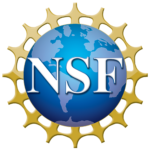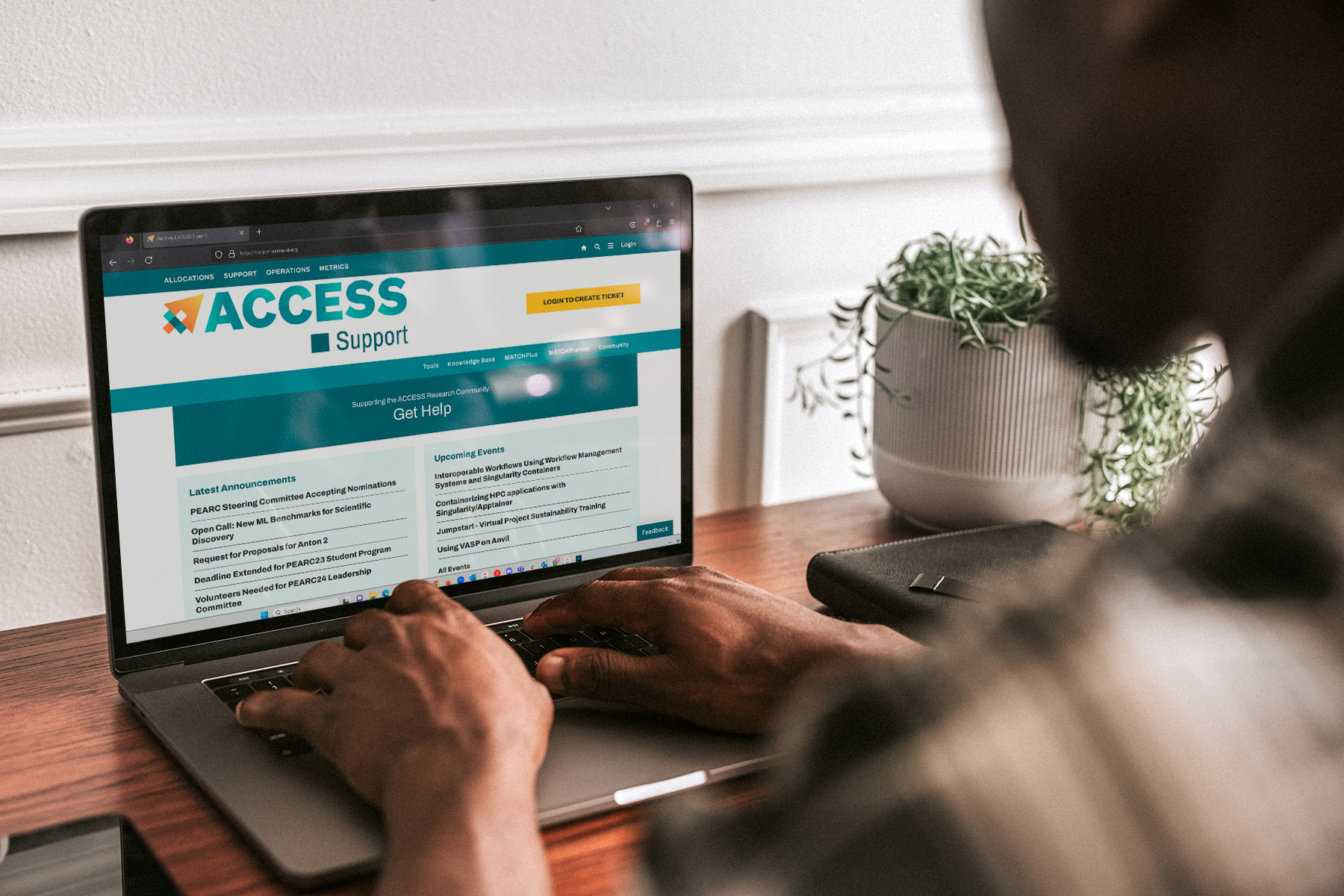ACCESS Support is designed to connect the research community with the help they need. Once you have your allocation and are ready to proceed, you might encounter situations where assistance becomes necessary, or it may be your first time doing research on a supercomputer. This is where the ACCESS Support team steps in, carrying the torch to guide you through to the finish line with an array of tools in a multi-tiered support program.
Powerful Tools
Researchers can do their work more efficiently with tools like Open OnDemand, a graphical interface to supercomputers, and Pegasus, a workflow automation tool.
Open OnDemand
Open OnDemand (OOD) has been a game changer for ACCESS. Open OnDemand is an open-source portal that enables web-based access to HPC services. This powerful application was developed by the Ohio Supercomputer Center (OSC), an ACCESS resource provider, and funded by the National Science Foundation. It was designed to be so easy to use that researchers can even use Open OnDemand on their mobile phones or tablets!
The goal of the Open OnDemand project is to make using resources as simple as possible. Many popular tools and software are available, including Jupyter, RStudio, VS Code, MATLAB, Mathematica, Paraview, and many more. Open OnDemand has been met with enthusiasm by resource providers and researchers alike and is available on the majority of resources allocated by ACCESS.
ACCESS Pegasus
ACCESS Pegasus is a web-based system designed to offer robust workflow management capabilities to ACCESS users. Created with user-friendliness in mind, Pegasus provides tools for composing, submitting, monitoring and debugging workflows. It also features comprehensive, self-guided training modules to assist users in leveraging ACCESS resources via scientific workflows.
The system has been integrated with San Diego Supercomputer Center (SDSC) Expanse, Pittsburgh Supercomputing Center (PSC) Bridges2, Purdue Anvil, Texas Advanced Computing Center (TACC) Stampede2, and Indiana University (IU) Jetstream2, and has been adopted by a select group of workflow users.
Knowledge Base
Documentation
The Support team has developed extensive, searchable documentation, often referred to as “The Knowledge Base.” Researchers can search official ACCESS documentation, community-contributed resources and other related documentation to help find the answers they need. Documentation is also integrated into the ticketing system with semantic AI to suggest articles that might help resolve an issue immediately without needing to wait for a response from an expert.
Ask.CI Q&A Forum
Another source of support is Ask.CI, a community Q&A forum moderated by experts and assisted by the Support team. Solutions to common questions provide help for the research community. Participation in the Ask.CI forum can also qualify for CCEP travel support to conferences.
Community
Affinity Groups
Affinity Groups help connect researchers with communities of interest. Announcements, documentation, events and trainings can be shared. People with allocations on ACCESS resources will automatically be connected to the appropriate Affinity Groups. Other groups are focused on areas of interest, such as AI or quantum computing.
If you’re part of a research computing community, consider connecting with the ACCESS ecosystem and engaging your community with Affinity Groups. You can request a new Affinity Group here.
CSSN (The Computational Science & Support Network)
The CSSN is a community of practice to advance campus research computing through sharing knowledge and building relationships. An inclusive community of researchers, students, research computing facilitators, software and systems engineers, and others, the CSSN provides the community with methods to exchange knowledge, learn from each other and advance science.
● MATCH
ACCESS MATCH Services connects researchers with consultants, mentors and students to help solve their research problems.
Perhaps you need assistance scaling your code to take advantage of the massively parallel architecture on your new allocation. Are you integrating a new machine-learning model into your workflow?
Anyone can submit a project to request MATCH assistance. Often this will be at no cost to the researcher since the CSSN Community Engagement Program (CCEP) program funds engagements with a mentor/student team. The MATCH program is designed to help researchers achieve their research goals but also provides valuable workforce training for students who are paired with experienced mentors. Professional consultants are also available for longer-term projects.
You can find out more about MATCH, see current projects and request your own engagement here.
If you’re interested in participating as a mentor, student, or consultant with MATCH, find out more and join the CSSN. People interested in assisting researchers can be matched with appropriate research projects by selecting their skills in their Community Persona and indicating interest in new projects that are recruiting.
● CCEP
The CSSN Community Engagement Program (CCEP) is brand-new to the community. The vision was created out of a desire to support our community members who are either part of the CSSN or wish to be part of the CSSN with a reward of travel grant opportunities in return for creating documentation, answering questions, providing pertinent training links, or live events for the ACCESS community.
The travel award itself and what it covers is up to the submitter – they can elect to cover registration, flight and/or hotel at varying tier levels of rewards ranging from $750-$2,500. The opportunity is open to everyone; new or established ACCESS users 18+ years of age currently at a US-based institution who are eligible to work in the US. During its first year, over 100 submissions were reviewed and an even more robust second year of applications is expected. Interested? Apply here.
Summary
The seamless usability of ACCESS owes much to the diligent efforts of the Support team. Their extensive engagement initiatives, provision of training avenues, curation of the knowledge base, introduction of innovative ticketing solutions, and tools like Pegasus and Open OnDemand have contributed to elevating the ACCESS user experience.
Moving forward, the Support team remains committed to leveraging their accomplishments and gleaning insights from challenges and feedback from the community. Support plans for further refinement of existing tools, continuing to grow a broad and diverse community, and supporting new user needs all directed at ensuring a scalable support ecosystem crafted to cater to research across all domains and skill levels.


